riding far blog
Our goal is to raise riders' awareness of the importance of mental and emotional skills in equestrian sport. We help equestrians achieve their personal riding goals.
WE SUPPORT, CHALLENGE AND INSPIRE EQUESTRIANS
We hope you will enjoy our insights in the forms of Casual Conversations, videos and articles aimed at helping the equestrian transform their relationships with their horses. We are passionate about sharing our knowledge, tips, tricks, and experiences.
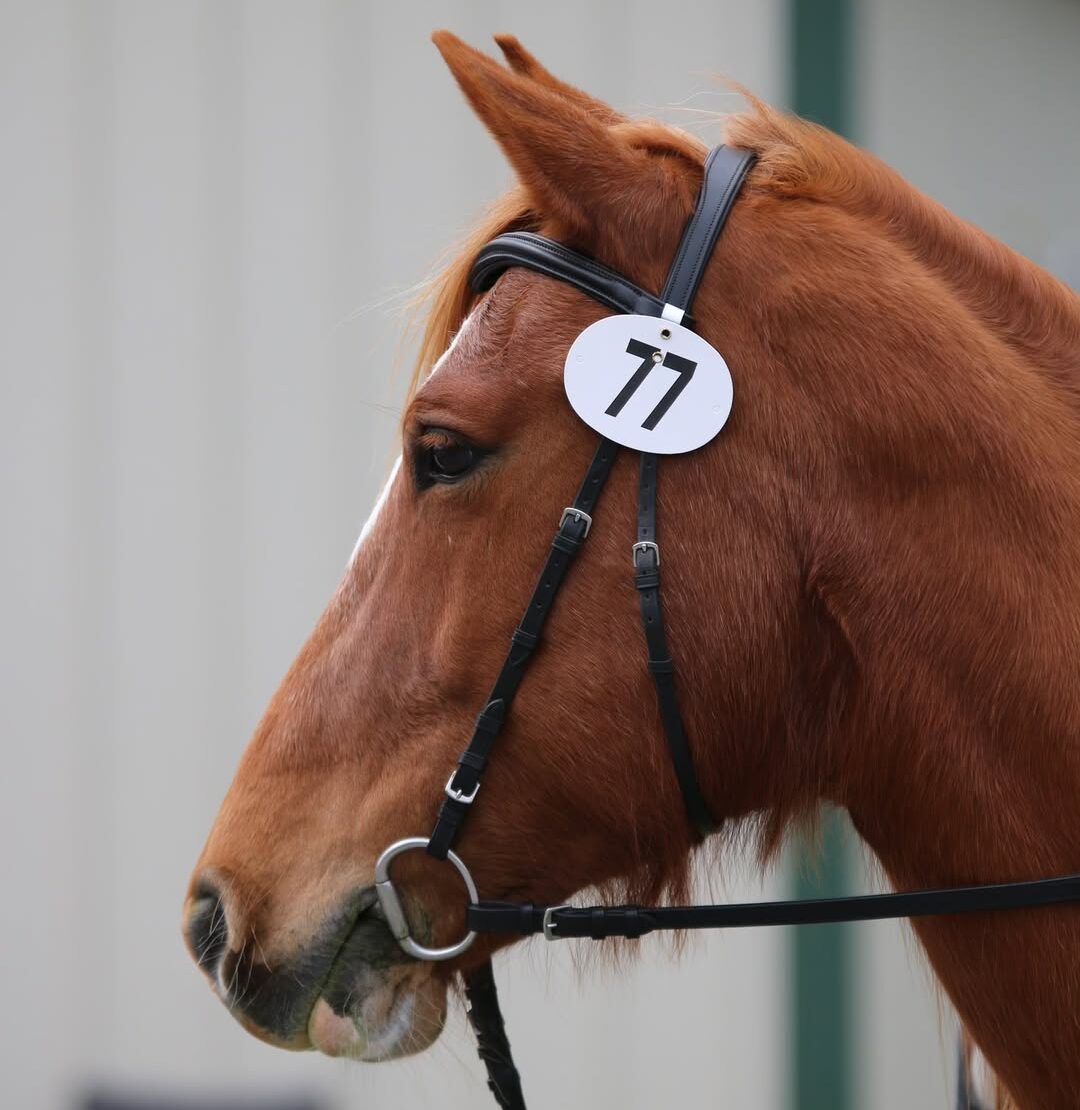
June 13, 2025
Last year my son Luke received a grant to compose a piece that “elevated the voices of post-incarcerated women” for the Freedom Fighting Missionaries (FFM) that serves post-incarcerated and justice-involved individuals and families. Last night his piece premiered at FFM’s annual fundraising gala. On a personal note, I am incredibly proud of this young man for his talent, vision, compassion, hard work, and the creation of this powerful piece. After his piece was played, he walked back over to our table and said something to the effect, “400 man hours and… that’s it.”
The parallel to any riding competition, or any project culminating in a defined outcome for that matter, is striking. After hours, years, and sometimes decades, it all boils down to a few minutes and… that’s it.
Imagine for a moment that your sense of self-worth and your identity was all wrapped up in the performance. What stood out for me last night was the difference between the performance which will be judged by each individual through their own personal filters and Luke’s experience of creation. I know my son to be the man who sought to serve the community rather than himself. I know my son to be the man who endeavored to connect with and compassionately understand the experiences of the women he interviewed. I know my son to be the man who worked diligently and creatively to give these experiences life in music. And, he is so much more than the performance of one piece. So much more than a composer.
It is a reminder for me this year as I enter into our clinic season and step into working equitation competition that I am so much more than my performance in any of these roles at any time. Join me in knowing and embracing our larger selves, drawing our sense of value and esteem from all of who we are and all of what we do. Then we might say, “400 man hours… Yes!!!”
~ Paul
#performance#performanceidentity#selfworth#bestself#equestrian#equestrianlife#sportpsych#equestriansportpsych#sportpsychology#equestriansportpsychology
Read More
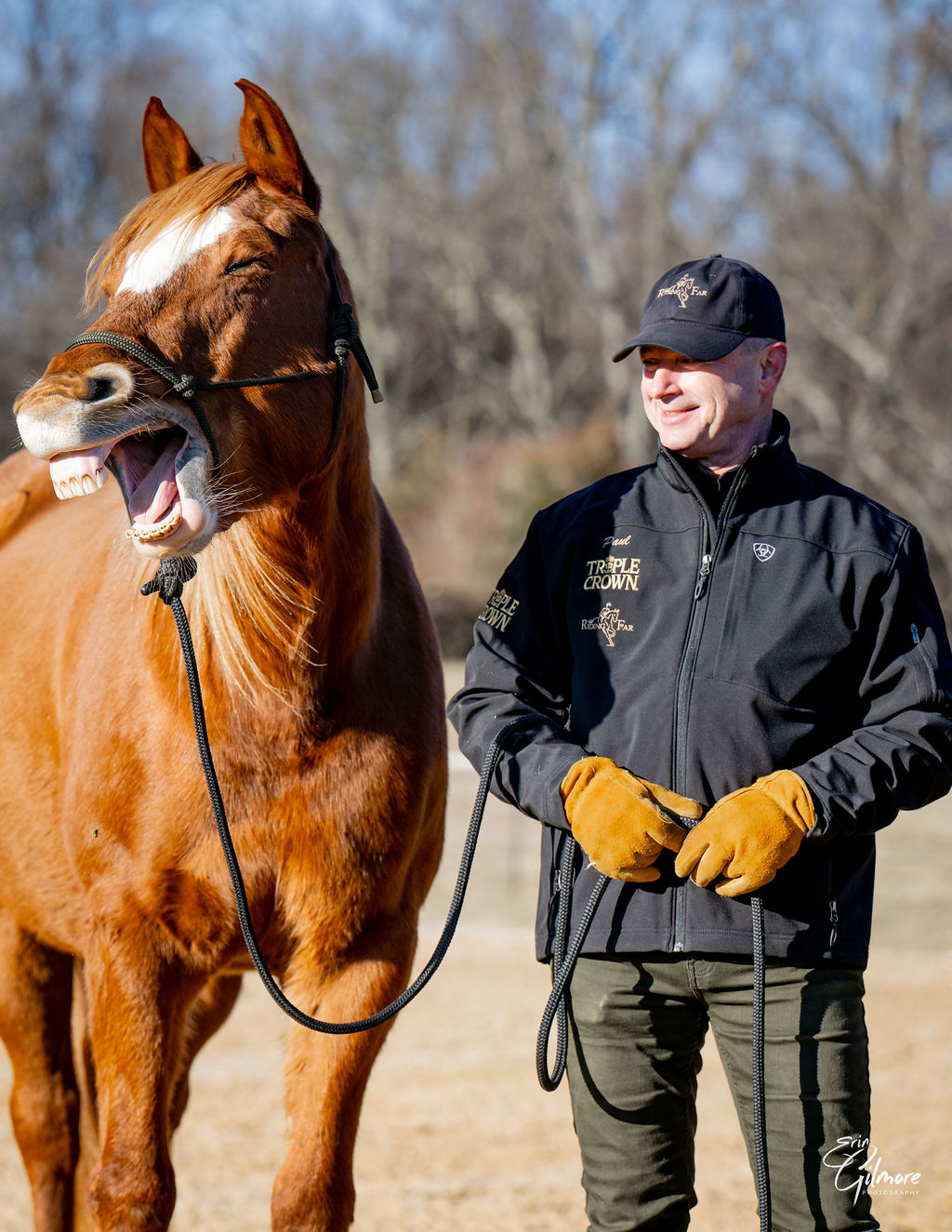
An old saying goes, “You can’t train a horse if you can’t move its feet.” We often focus on shaping our horses’ active behaviors, but what do we do when they are shut down, checked out, and hard to reach?
The same applies to riding students. Most instructors find it easier to correct or guide a student’s active riding behaviors (or misbehaviors) than to engage them when they’re disengaged or shut down. Think of the student who never seems to hear your instructions, the one who stops riding and sits idly with their horse in the middle of the arena, or the stressed rider who mentally “disappears” during your conversation.
Wouldn’t it be empowering to have the knowledge and tools to handle these challenging situations effectively? How would it feel to respond with calm confidence, free from worry, self-doubt, or frustration?
The key to staying composed and self-assured in these interactions lies in understanding the dynamics at play and employing effective strategies. Just as learning to ride builds confidence through knowledge and practice, developing skills to manage difficult student interactions enhances your ability to navigate challenges with ease.
That’s why we’re offering a free online class designed for instructors, coaches, and clinicians. Choose from three live sessions:
- June 12 at 7:00 PM EST
- June 16 at 12:00 PM EST
- June 18 at 7:00 PM EST
In this session, we’ll explore:
- Why emotional outbursts occur in the saddle, even when everything seems fine
- What’s happening in a student’s nervous system during moments of distress
- How to support your student without taking on responsibility for their emotions
You’ll walk away with deeper insights and practical tools you can apply immediately.
We’d love to have you join us.
Save your seat here Button: https://course.ridingfar.com/join-us
June 10, 2025
Read more
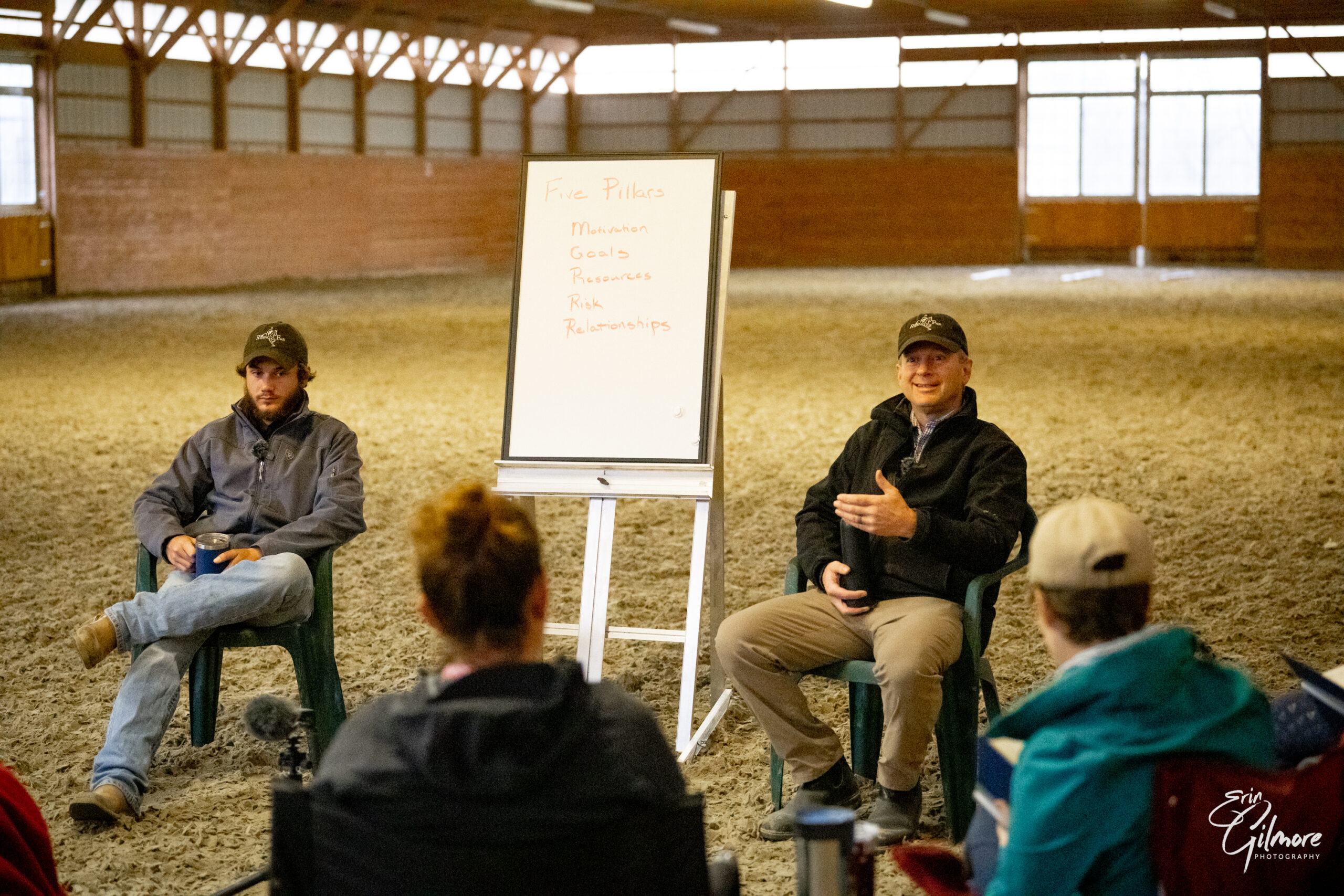
June 10, 2025
We are excited about our latest endeavor: providing specialized resources for riding instructors. Through our work, we’ve realized that many instructors, particularly in the United States, receive extensive training in horsemanship and technical expertise but little guidance on teaching people effectively. This gap in training is significant. Understanding human learning and emotions is crucial for successful instruction.
Riding often evokes strong emotions in students, such as fear, excitement, or self-judgment. Yet, instructors are rarely equipped with strategies to address these emotional responses or the science behind how people learn. To bridge this gap, we’re developing resources to help instructors manage emotions, implement effective teaching strategies, and better support their students.
As part of this initiative, we’re offering a free online class designed specifically for riding instructors, coaches, and clinicians. Join us for one of three live sessions:
- June 12 at 7:00 PM EDT
- June 16 at 12:00 PM EDT
- June 18 at 7:00 PM EDT
In this session, you’ll discover:
- Why emotional outbursts occur in the saddle, even when lessons seem to be going well
- What’s happening in a student’s nervous system during moments of distress
- How to support students without taking responsibility for their emotions
You’ll leave with a deeper understanding of these dynamics and practical tools you can apply immediately in your teaching.
We’d love for you to join us!
Save your seat here (Button: https://course.ridingfar.com/join-us )
Read More
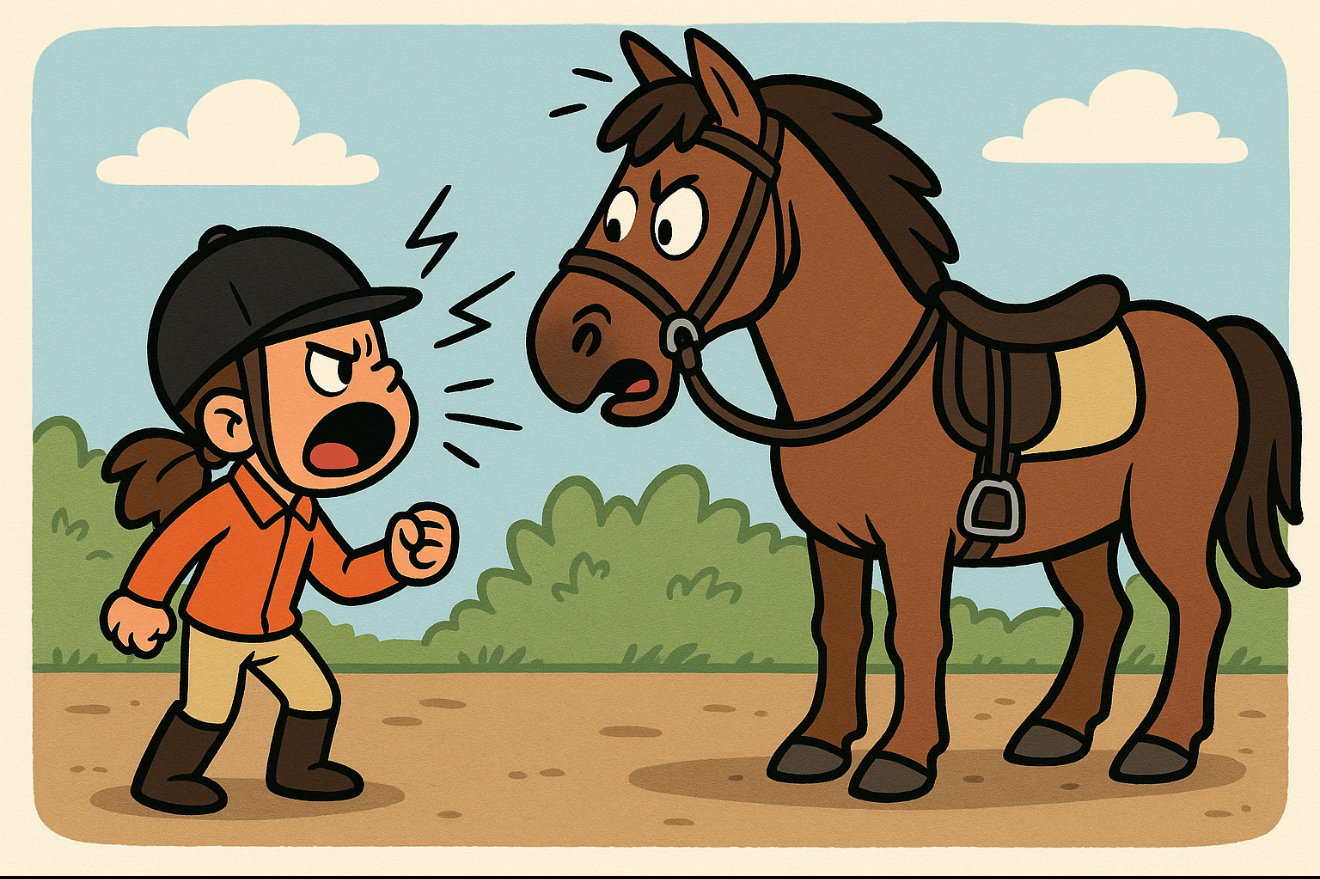
As a student of riding and horsemanship, I’ve often felt frustrated. These days, I believe I manage it well, recognizing that frustration is a natural part of tackling challenging tasks. With age, I’ve grown more patient, self-compassionate, and better at pausing before reacting to my emotions.
As a teacher, it’s painful to watch students get lost in anger or frustration, especially when those feelings are directed at the horses they ride. This is a common concern shared by our instructor clients.
Helping clients regulate emotions like frustration and anger can be daunting, particularly if you lack foundational knowledge. Effectively supporting students requires understanding emotions—their functions, and how they influence thinking and behavior—along with practical strategies to help students manage their feelings. For example, did you know that frustration and anger are often secondary emotions, serving a protective role?
That’s why we’re offering a free online class designed for instructors, coaches, and clinicians. Choose from three live sessions:
- June 12 at 7:00 PM EST
- June 16 at 12:00 PM EST
- June 18 at 7:00 PM EST
In this session, we’ll explore:
- Why emotional outbursts occur in the saddle, even when things seem fine
- What’s happening in a student’s nervous system during distress
- How to support your student without taking responsibility for their emotions
You’ll leave with a deeper understanding and practical tools you can apply immediately.
We’d love to have you join us.
Save your seat here: https://course.ridingfar.com/join-us
June 8, 2025
Read more
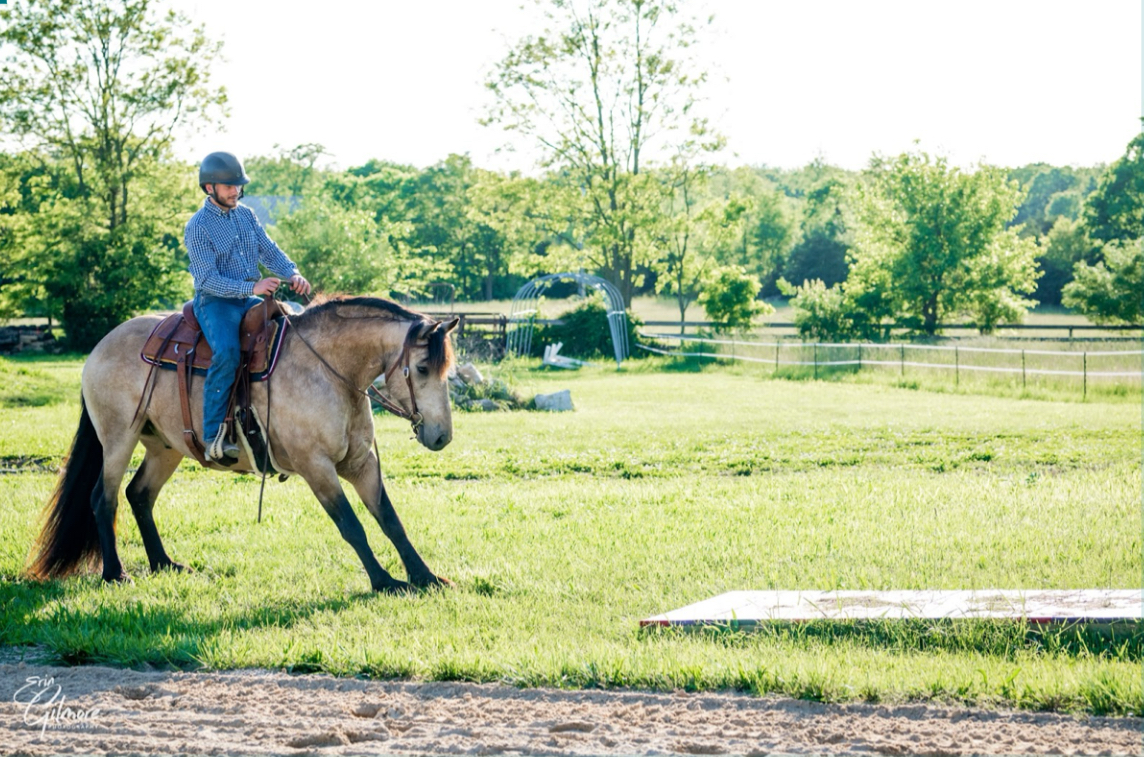
June 7, 2025
As a dedicated riding instructor, you’ve invested time and effort to hone your skills and deepen your knowledge. Your passion lies in helping your students grow, progress, and succeed in their riding journey. You can see the path forward clearly, and the next step is right there, waiting for them to take. Yet, sometimes, something holds them back.
Every trainer knows the story of a promising student whose progress stalls. You recognize their potential and have equipped them with the skills to take the next step. But when they reach that threshold, they freeze, as if an invisible barrier blocks the way. The culprit? Fear.
Fear is a natural part of our human experience, hardwired into our neural architecture to keep us safe. It has helped us survive and navigate an uncertain world, encouraging caution as we explore new territory. However, not everyone experiences fear in the same way. Some riders can step far outside their comfort zone while staying grounded and composed. Others have a smaller window of tolerance, becoming overwhelmed by anxiety, which may manifest as argumentative behavior, tears, or freezing in the saddle.
Throughout my career, I’ve worked with riders to navigate their fears and supported instructors in developing the understanding and tools to guide their students through these challenges. Helping students grow emotionally as riders is much like training horses: while occasional breakthroughs happen, progress is often gradual, built through small, steady steps. To stay on this path, you need confidence in your skills and a supportive community to turn to when challenges arise.
We’ve heard your calls for accessible resources and support, and we’re here to help. Join us for our upcoming Emotions in the Arena webinar, where you’ll learn three key strategies to help your riding students manage their emotions, stay focused, and build resilience in the arena.
We know your time is precious, so we’re offering this free webinar on three different days and times to fit your schedule. Reserve your spot here (https://course.ridingfar.com/join-us) and take the first step toward empowering your students to overcome fear and thrive. We look forward to seeing you there!
~ Paul
#RiderConfidence #EquestrianMindset #OvercomeFear #emotionsinthearena #horses #ridingfear #ridingfar #ridingfarllc #equestrian #equestrianlife #sportpsych #equestriansportpsych #sportpsychology #equestriansportpsychology
Read More
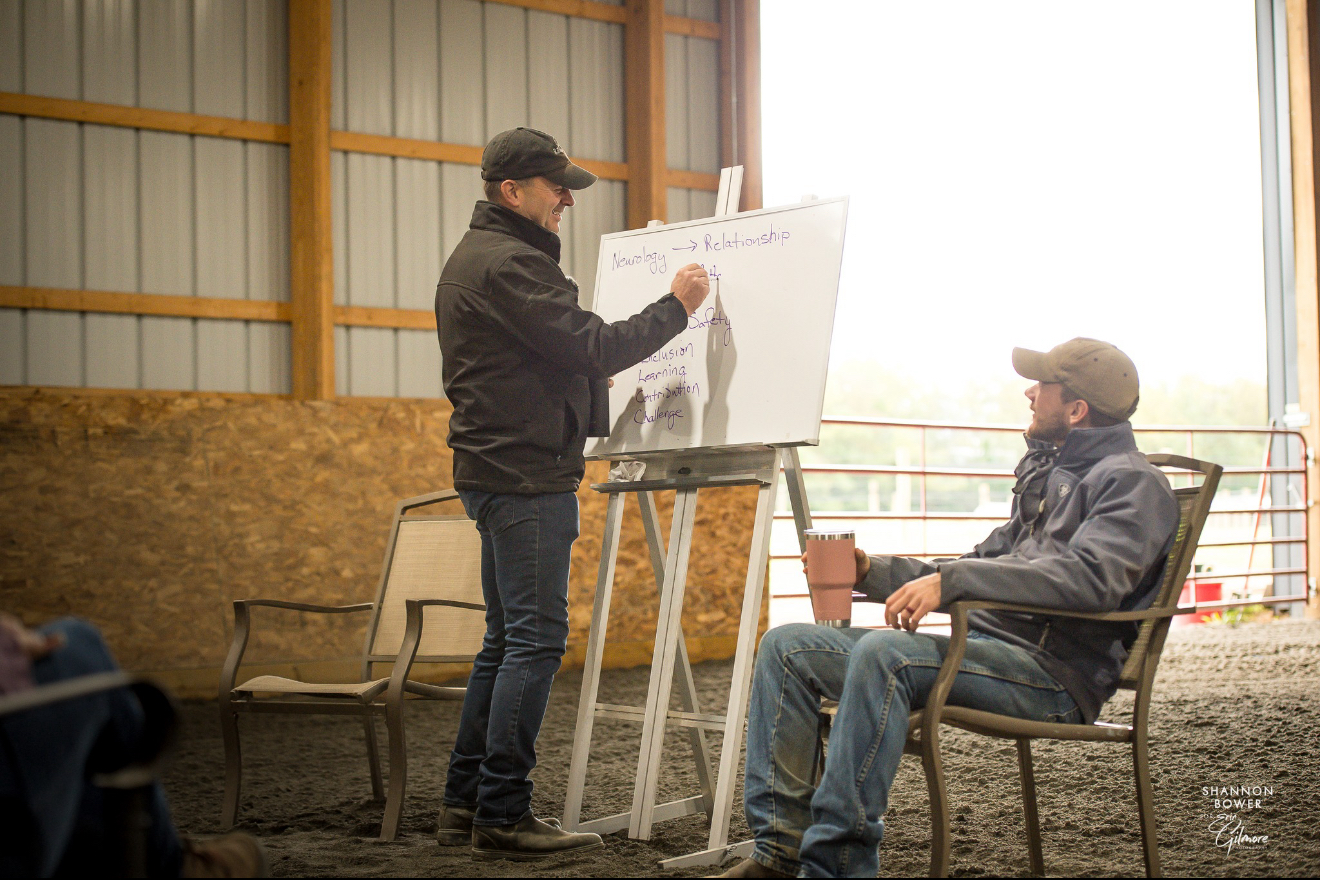
When the arena gets emotional, the horse is often the least complicated part.
We’ve all had those moments in a lesson, a student wells up unexpectedly, they go quiet, they get frustrated at a simple request…and suddenly, we’re not just teaching riding anymore.
We’re navigating fear. Frustration. Even shame.
Most of us weren’t trained for that part.
That’s why we’re offering a free online class designed specifically for instructors, coaches, and clinicians:
Choose from 3 live sessions:
June 12 at 7pm EST
June 16 at 12pm EST
June 18 at 7pm EST
In this session, we’ll explore:
- Why emotional outbursts happen in the saddle—even when things seem to be going fine
- What’s happening in the nervous system of a student in distress
- How to support your student without becoming responsible for their emotions
You’ll walk away with a deeper understanding and a few clear tools you can use right away.
We’d love to have you join us.
Save your seat here: https://course.ridingfar.com/join-us
June 6, 2025
Read more
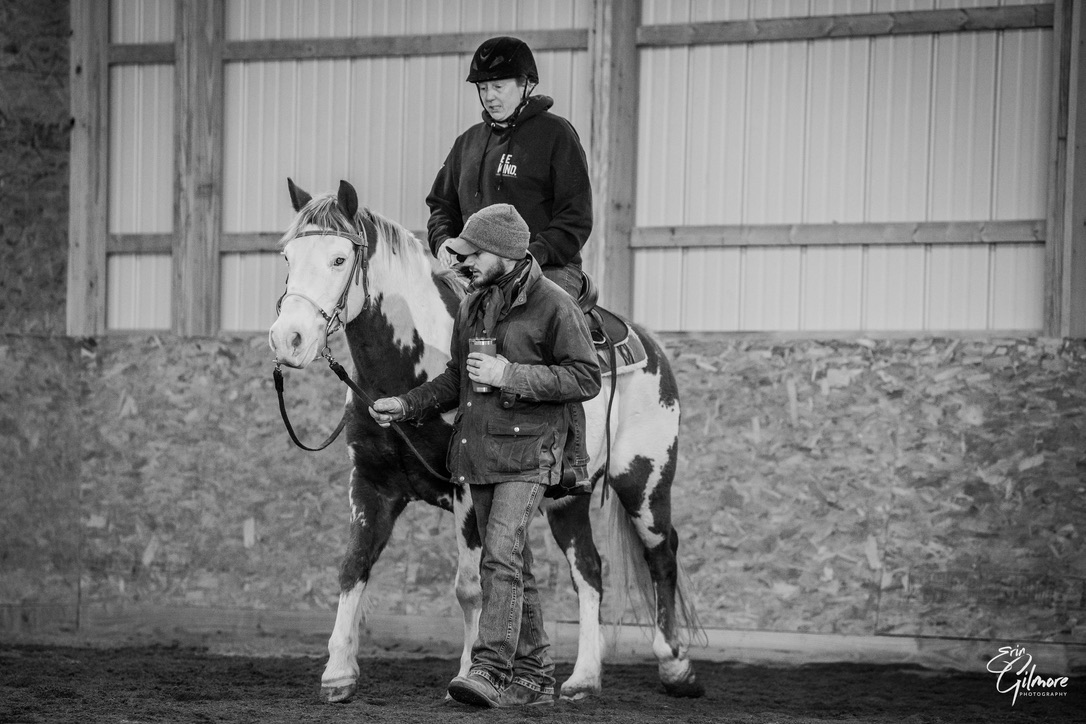
June 4, 2025
As riding instructors, we often witness intense emotions in our students. The challenges of horseback riding—whether mastering a new skill or facing a horse’s unpredictable nature—can spark fear, frustration, or tears. When a student has a meltdown, it’s easy to feel overwhelmed or unsure how to respond.
Our instinct might be to control the situation with phrases like, “It’s not that bad,” or “Stop crying,” or even offer bribes to regain calm. While these tactics may seem effective in the moment, they often fall short and can lead to recurring emotional outbursts.
There’s a better way: empathic connection. By pausing to see the situation through your student’s eyes, understanding their experience, and showing genuine curiosity, you can defuse intense emotions and build trust. This isn’t about agreeing with their perspective—it’s about making them feel seen and safe.
Here’s how to put empathy into practice:
- Pause and Observe: Take a moment to notice your student’s emotional state without judgment.
- Reflect Their Experience: Say something like, “I can see this feels really tough right now. Can you tell me what’s going on?”
- Validate Their Feelings: Acknowledge their emotions without trying to fix them immediately. For example, “It’s okay to feel scared; riding can be challenging.”
Empathy engages the nervous system’s natural ability to regulate emotions. While it’s not a magic fix—some riders may still struggle with anger or tears—it creates a safe space for emotional growth. This approach fosters resilience, strengthens the instructor-student bond, and helps riders feel valued, setting them up for success both in the saddle and beyond.
Let’s embrace empathy in our teaching to create a supportive environment where our students can thrive. How do you support your riders’ emotional regulation? Share your strategies below!
~ Paul
Read More
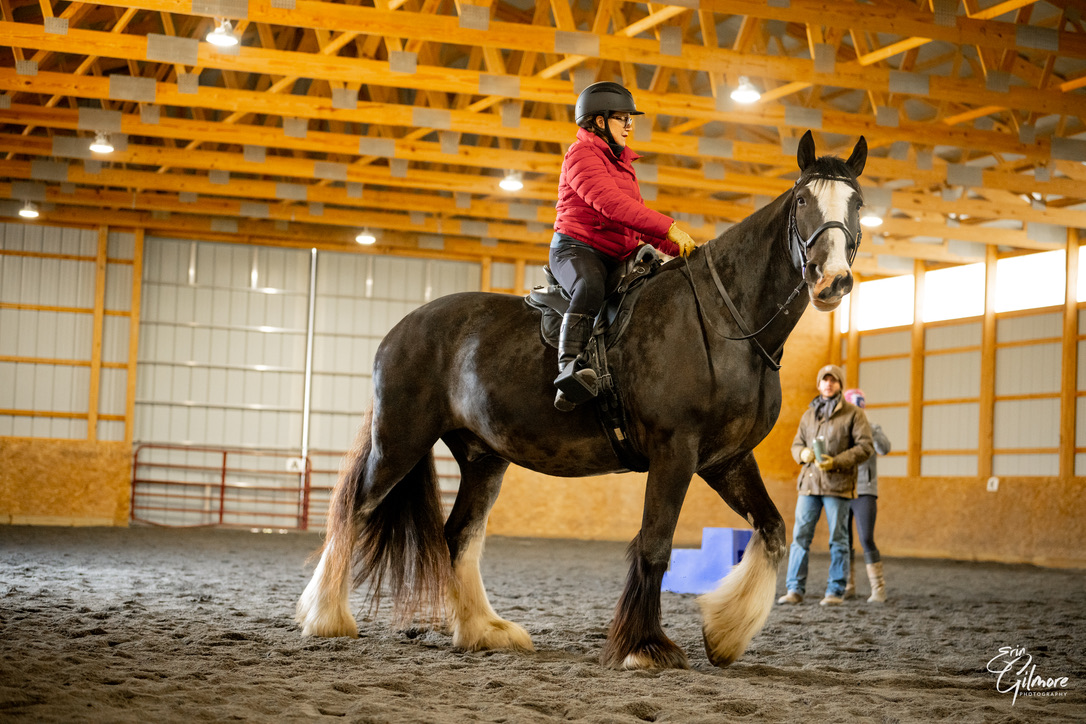
For all of us there are moments in a lesson when the horse is the least complicated part of being in the arena.
We’ve all been there when a student suddenly wells up mid-ride, or they go silent, or respond to a simple request with visible frustration.
As instructors, we often find ourselves supporting our students through more than just riding techniques. The emotional landscape of the arena can be complex and unexpected.
Riding Far is putting together a free training for instructors, coaches, and clinicians to help navigate these moments with greater clarity and confidence.
We’d love your help shaping it.
To make sure it speaks directly to what would help you the most, we’ve asked a few questions a short form, it just takes a few minutes.
If you’ve ever thought, “I wish I had more tools for these moments,” we’d be honored to hear what you need.
You’re welcome to remain anonymous.
Click here -> https://link.ridingfar.com/widget/form/N04MzDGpRHPeU61HEjdg
Thank you in advance for helping us help you.
June 1, 2025
Read more

May 31, 2025
Train Tracks
The other day, a client called and asked if I had time to talk. They were having a particularly difficult day and hoped for a brief reset to gain some perspective. On tough days like that, it can feel like we’re on a runaway train. We may not like where we’re headed, but trains travel on tracks, and it often seems like we have little choice in the matter.
There’s an old saying: “If you get on the wrong train, get off at the nearest station. The longer you wait, the more expensive the return trip will be.” However, this requires us to recognize that we’re on the wrong train, find a station where we can disembark, and slow the train enough to step off safely.
Throughout my career, I’ve helped people find their way off runaway trains. One of the most important lessons I’ve learned is that to assist someone effectively, I can’t be on the same set of tracks. If I jump onto their tracks and get lost in their perspective, one of two things inevitably happens: I either get run over or sucked into riding their train with them. Neither outcome is particularly helpful.
So, what do you do when a student is struggling during a lesson? How can you help them slow their proverbial train or change tracks? The most critical step is to stay on your own set of tracks. This is what experienced trainers do when working with a troubled horse. They maintain their calm, trust in the process, and rely on their experience. They avoid getting caught up in the emotional energy of the horse.
Your train should be powered by knowledge, experience, and confidence that you can guide your student safely through the crisis.
My advice? Build your tracks before you need them. Invest in yourself by working on staying grounded and improving your emotional regulation. Additionally, invest in understanding your students—how they learn, how emotions function, and a set of skills you can share to help them regulate themselves.
As you grow, you’ll develop a process you can trust. Then, you can invite your students to join you on your set of tracks.
Photo by Neelkamal Deka on Unsplash
Read More
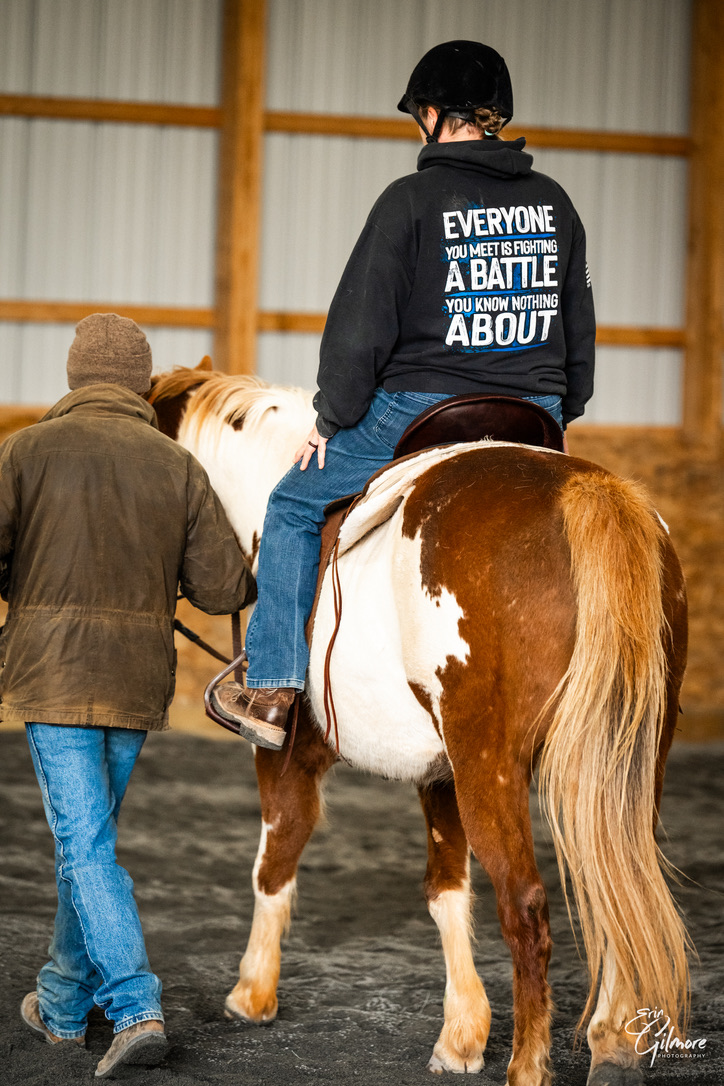
Advice for Riding Instructors: Helping Students Regulate Emotions
As a riding instructor, you have a unique opportunity to guide your students not only in mastering their riding skills but also in managing their emotions. One powerful concept can help you and your students navigate challenging moments in and out of the saddle: You are not what you feel. This simple idea can spark profound change, empowering your students to stay grounded when emotions run high.
When a student is struggling—perhaps feeling overwhelmed by frustration after a difficult ride or anxious about an upcoming competition—it’s easy for them to become consumed by those emotions. In those moments, their feelings can seem to define their entire experience, even who they are. As their instructor, you can help them step back and regain control by teaching them to separate themselves from their emotions.
Practical Steps to Help Students Regulate Emotions
- Introduce the Concept of the Observing Self
Teach your students that they are not their emotions. Encourage them to practice observing their feelings without judgment, much like they observe their horse’s behavior during a lesson. For example, if a student is upset after a fall, guide them to notice their feelings—say, “I feel frustrated” rather than “I am frustrated.” This small shift creates mental space, helping them see emotions as temporary states, not their identity. - Model Emotional Regulation
When working with a student who’s struggling emotionally, stay calm and grounded. Just as you maintain steady energy when handling a nervous horse, model a composed presence. Your calm demeanor shows students that they can trust the process, even when emotions feel overwhelming. For instance, if a student is anxious about a jump, acknowledge their fear calmly and guide them through a breathing exercise before continuing the lesson. - Teach Awareness of Thoughts and Feelings
Help students build awareness by encouraging them to pause and notice their thoughts and emotions during a lesson. For example, during a challenging exercise, ask, “What are you feeling right now?” or “What thoughts are coming up?” This practice helps them recognize emotional patterns, like tension before a canter transition, and respond thoughtfully rather than react impulsively. - Apply the Concept to Thoughts
Extend this idea beyond emotions to thoughts. Students often get stuck in negative thought loops, like “I’ll never get this right.” Teach them that just as they are not their feelings, they are not their thoughts either. Encourage them to observe their thoughts as passing clouds, not facts. For instance, if a student says, “I’m terrible at this,” guide them to reframe it: “I’m having the thought that I’m struggling, but I can keep practicing.” - Build Emotional Regulation Skills
Equip your students with tools to manage their emotions, such as deep breathing, visualization, or grounding exercises. For example, before a lesson, have them take three slow breaths, focusing on the sensation of the air to calm their nerves. You can also encourage them to visualize a successful ride, which builds confidence and reduces anxiety. These skills are like building strong tracks for their emotional “train” to run smoothly.
Why This Matters in Riding
Riding is as much an emotional journey as it is a physical one. Horses are highly sensitive to their rider’s emotional state, and unregulated emotions can disrupt the connection between horse and rider. By teaching your students to observe their emotions and thoughts, you help them stay present and communicate clearly with their horse, fostering a stronger partnership.
May 30, 2025